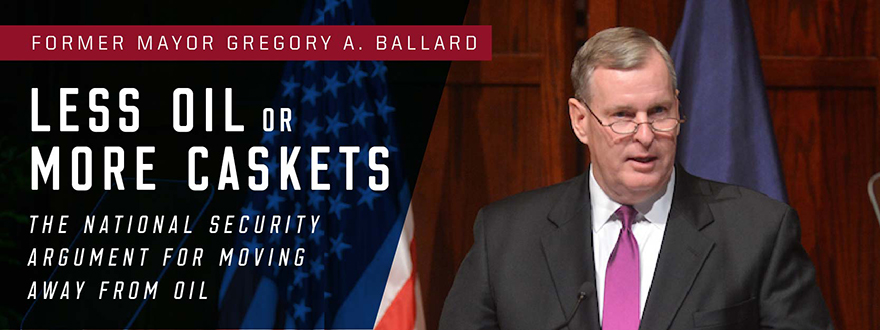Greg Ballard makes case for energy independence in new book

Disruptive technologies like autonomous or electric vehicles enjoy plenty of media attention. In a new book, University of Indianapolis Visiting Fellow, former Indianapolis Mayor and Marine Lt. Col (ret.) Greg Ballard links those oft-cited buzzwords to unexpected topics: protecting the lives of American troops now serving in the Middle East, and shifting toward an energy-independent economy.
In his latest book, “Less Oil or More Caskets: The National Security Argument for Moving Away from Oil” (Indiana University Press), Ballard explores the impact of moving the United States’ transportation technology to a “post-oil” model. With 70 percent of the oil in the world being used for transportation, the book makes the case for alternative transportation fuels with the goal of saving U.S. troops’ lives, defunding terrorism and reducing the federal budget.
“It should be obvious to everyone that we continue to suffer enormous losses in lives and dollars just to protect the flow of oil for the world. But what if the world did not need that oil? Could we then bring our troops home from the Middle East and defund terrorism at the same time?” Ballard asked. “The current scenario has already cost us thousands of lives and trillions of dollars, but now there’s new technology in how we fuel transportation.”
By changing the fuel in our vehicles and embracing new technologies in transportation, Ballard argues that within two decades our nation and the world could be on the path to freedom from the current dependence on oil-rich nations.
“Most people don’t know that our troops are over there to protect oil,” he continued. “As a veteran of the Persian Gulf War in 1990-1991, a war that was clearly about the availability of oil in order to maintain the global economy, I thought there might be a way for the United States and the world to lessen its need for oil.”
Ballard believes advances in technology that make electric vehicles possible can help change the dynamic in the Middle East so that oil is no longer a critical strategic commodity.
“If we can get oil to that point, then the world changes,” he said. “We have a technology staring us in the face to change that dynamic peacefully and we should be doing it.”
Changing consumer mindsets will be key to making the transition, and as the technology becomes more convenient, Ballard believes broader consumer adaptation will follow. The book also urges state and municipal governments to convert their fleets to electric vehicles.
“With autonomous vehicles and transportation fuel changing, people will have to get comfortable with this. It’ll be disruptive, but ultimately it will change people’s lives for the better,” Ballard said.
Ballard will host a discussion about the book at 6:30 p.m., Monday, Feb. 11, 2019, in the Schwitzer Student Center (UIndy Halls B & C) at the University of Indianapolis. Ted Frantz, professor of history and director of the Institute for Civic Leadership & Mayoral Archives, and Laura Wilson, assistant professor of political science, will join him for the discussion. A question-and-answer session and book signing will follow, with books available for purchase.
